Human society needs superstructures to conform to at the end of the day, the concept of the establishment is one such superstructure that maintains order in society. However, what happens when the establishment becomes oppressive? There are always individuals who express dissent, they revolt against the existing structure and try to bring in change. Then again there are always individuals who are by nature against any superstructures, these individuals are so grounded in their subjectivity that they refuse to conform to any objective value system set. If nothing else, anti-establishment characters are endearing because we always love to watch the little guy or the underdog win, and here is the list of top anti-establishment movies ever made.
12. Zabriskie Point (1970)

Directed by Michelangelo Antonioni, this film explores the counterculture in the US against the backdrop of student protests. Initially falling flat both commercially and critically, the film eventually went on to receive a cult status and was widely appreciated. The plot follows the adventures of Mark and Daria. Mark is a radical student agitator who buys a gun with the intent to shoot a policeman if necessary and he is willing to die for the cause – which is an organized student strike. The film shows several clashes between the police and the students and Mark at one point give his name as Karl Marx in a police station. Daria, on the other hand, is a conformist for the most part but her meeting and subsequent interactions with Mark changes her and later after news of Mark’s death at the hands of the police reaches her she imagines a wealthy businessman’s house being blown up. Daria’s radicalization and Mark’s anti-establishment attitude give the film the necessary fuel to stand outside the mainstream narrative.
11. Gandhi (1982)
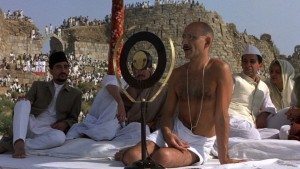
Ironically the man who played a huge role in removing colonial British forces from India was memorialized in a British epic historical drama, directed by Richard Attenborough and starring Ben Kingsley. The film starts on the day of Gandhi’s assassination and backtracks to how the man came from South Africa to India and consolidated the revolution against the British. To stand against the might of the British empire in a country weakened by numerous years of rule takes immense courage and Mahatma was an anti-establishment man through and through and his dissenting attitude is portrayed brilliantly by Kingsley in his Oscar-winning role.
10. The Wind That Shakes The Barley (2006)

Ireland is often overlooked by several people as a country that was just as oppressed by the British as India or Africa. In Ken Loach’s movie, Cillian Murphy and Padraic Delaney play the roles of Damien and Teddy O’ Donovan, two County Cork brothers who join the IRA to fight against the British army. The film which won the Palm D’Or remains one of Loach’s biggest successes and explores the oppression on the Irish people by the ruthless British army and the nonconforming IRA soldiers who bravely engaged in a guerrilla war with these British troops. The film sees the IRA members split over the treaty where Ireland is granted dominion status within the British empire. Teddy and Damien turn on each other and Damien who wants no compromise is ultimately crushed by the establishment which prefers compromise to radical elements. Damien’s character remains one of the finer examples of anti-establishment dissent as part of a group of soldiers who fought bravely for their country’s independence.
9. Fahrenheit 451 (1966)
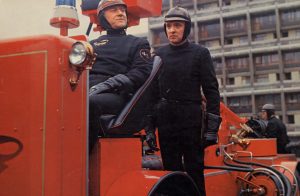
The film which was Francois Truffaut’s first color cinema is based on Ray Bradbury’s novel of the same name. The title refers to the temperature at which book pages catch fire and burn. The film follows an oppressive government that believes that books lead to unhappiness and makes people feel that they are better than others. Thus to ensure equality in society, the government tasks the firemen to destroy all literature. Within an extremely oppressive regime, this one man, Guy Montag begins to question his motive. It is one thing to be outside the totalitarian machinery, but to work for it and actively go on to subvert it is no mean feat. But Bradbury a fine author and Truffaut a director par excellence portrays dissent in the movie perfectly through Montag’s character arc as he not only gives up his old life but joins a counterculture secret society where people memorize one book so certain literature remains with them at any cost.
8. V For Vendetta (2005)

This film is perhaps most quoted in popular culture to support causes against oppression or by anarchists. Starring Hugo Weaving as V, a skilled and charming anarchist, V remains anonymous throughout the movie. The film sees the V rescuing a girl from being accosted by the police for staying out past the curfew. V methodically tries to take down the oppressive state machinery while effectively spreading his anarchist propaganda using the state’s medium of communication. Things come to a climax when millions march in Guy Fawkes masks having paid heed to V’s call. V himself tells the antagonist that ideas are bulletproof and he stands for an idea more than being just an individual. The climax sees the London parliament being destroyed but V dies in the process. A heart touching film about an everyman revolution, V is very proletariat and he orchestrates the downfall of an oppressive government while giving hope to the people, truly an anti-establishment character, but one who is capable of ushering in a good change in a broken system.
7. If… (1968)
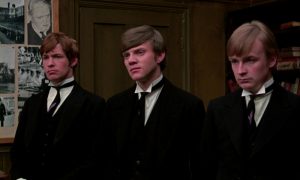
Directed by Lindsay Anderson this film shows a fictitious public school where the boys in the lower sixth form are persecuted and basically bullied by the whips, who are seniors in the sixth form. The film stars Malcolm McDowell who would later be known for playing Alex, an even more radically anti-establishment character in Kubrick’s ‘A Clockwork Orange’. The oppression goes to the extent of these boys being treated as servants and viewed as sex objects by these ‘prefects’. Gun violence figures largely in the movie as the nonconformist boys give vent to their anger against the establishment by opening fire on their housemaster and eventually the principal as well. The climax of the movie on Founders’ Day is bound to leave you dumbstruck by the sheer amount of violence and the rage that could have motivated it. Needless to say, the boys are as anti-establishment as they come and they believe that they can change a lot with a bullet in the right place, and why not, since the system repeatedly tries to crush them, they rise in revolt in an attempt to overthrow the entire system.
Read More: Best Terrorism Movies
6. One Flew Over the Cuckoo’s Nest (1975)
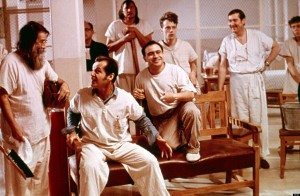
Directed by Milos Forman, this film remains one of the highest acclaimed movies to come out of Hollywood, and why not – the plot is fantastic, the acting and director are stellar. starring Jack Nicholson as the rebellious prisoner who is transferred to a mental facility, Jack’s character Randle soon tangles with the nurse Ratched who runs an oppressive house and dominates the patients and subjugates them. They get into a battle of wits but Randle refuses to conform to the norms, managing to steal a bus to go fishing, organizing a party with girls being brought in, fighting with orderlies and even strangling Ratched for instigating the suicide of one of the patients. However, Randle’s exhortations are ultimately subsumed under the establishment as he is lobotomized. His friend saves him from the indignity by killing him and escaping from the hellish facility. Randle plays a character who had to be forcefully brought under the establishment and even then he inspired others to take such a radical anti-establishment stance that one of them killed him before letting him become a thoughtless crony. Randle couldn’t think for himself at the time but if he was consciously present he would choose death over subjugation any day.
5. The Battle of Algiers (1966)
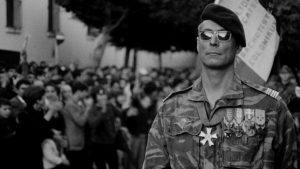
One of the most important films ever made on urban guerrilla warfare is this Gillo Pontecorvo movie about Algiers independence from the French. The film sees the consolidation of the revolutionary forces and the FLN’s insurgency tactics. One of the finest films ever made, this movie doesn’t focus on any particular protagonist, rather bringing a wholesome camaraderie and experience of a revolt on the screen where everyone plays a part in overthrowing an imperial establishment.
4. La Haine (1995)

Directed by Mathieu Kassovitz this film follows the life of three friends Vinz, Hubert, and Sayid, in the impoverished projects soon after a riot. The film tries to show the cruelty of fate as Vinz carries a gun with him and wants to shoot a cop. However, the events of the day wear him out and his various experiences make him realize the truth in Hubert’s words about hatred breeding hatred and he gives up the gun only to be shot soon after by a cop by accident. The film portrays these three characters as anti-establishment youth who engage in counterculture practices including an illegal rooftop party, smoking marijuana frequently and American hip-hop and free-styling which was the American counterculture spreading to other parts of the world through Hollywood at that time. Vinz’s model being Travis from Taxi Driver is also a giveaway and the general hatred towards cops and the state machinery including subtle touches like a graffitiing a poster to read ‘The world is Ours’ instead of ‘…is Yours’ becomes subversive moves often culminating in loud over the top actions like blaring ‘Nique La Police’ from the speakers in a deserted housing project.
3. A Clockwork Orange (1971)
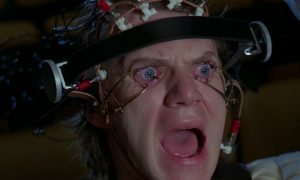
Directed by the talented Stanley Kubrick based on the Anthony Burgess novel of the same name, this film stars Malcolm McDowell a charming but delinquent young boy with an affinity for Beethoven. His misdeeds lead him to commit rape and he is institutionalized. The establishment uses some pretty experimental and harsh treatment of him and he is apparently rehabilitated to the extent that he cannot stand any aspect of his old life, even Beethoven. However, as the film plays on we see Alex (Malcolm) even try to commit suicide when pushed by his former victim. However, Alex’s attempted suicide helps him overcome the submission to the establishment as he goes back to his old self – Beethoven loving and in the mood for some sex and good old fashioned ultra-violence. A film that shows the true freedom of will and how human consciousness seeks subjectivity and shall always remain at odds with establishments, Alex becomes the personification of an aspect that simply cannot be tamed.
2. Fight Club (1999)
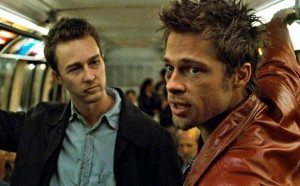
This David Fincher movie based on Chuck Palahniuk’s novel of the same name is perhaps one of the most anti-establishment movies out there. A lot has been written about this film and not much is left to be said – but the characters of Tyler Durden and the unnamed man played by Edward Norton, the character of Marlene, all the other members of the Fight Club – they are all marginalized in reality. Life has them all subsumed under the biggest establishment – the capital and the tantalizing dream that they must chase. On realizing the unattainability and the futility of the same this club becomes a physical vent for the emotional and psychological frustration of surviving in a cold capitalist world. A movie that takes a radical approach from building bombs with soap right up to wiping everyone’s credit debt, Fight Club remains a film that makes establishments tremble because it makes them realize how easy it is to fall to the common man.
1. Battleship Potemkin (1925)
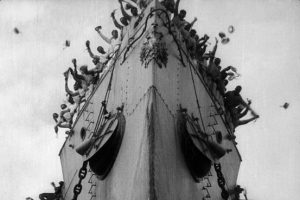
No one, I repeat no one does revolutionary films better than Sergei Eisenstein. But then again, he’s Russian. Perhaps they just understand revolutions better. The story follows the historic mutiny of 1905 when the crew of Battleship Potemkin rose up against the officers. The film is divided into five parts which show different stages of the mutiny. The most memorable is the Odessa step sequence where the people cheering for the rebels face the cold hard machinery of the state – in the form of a mechanical and cold-blooded assault. The sailors in all their anti-establishment glory use the guns of the battleship to fire upon the military headquarters. The end of the movie is a touching moment when the tension of the inevitable clash with the Tsar’s fleet is evaded when the other ships refuse to fire upon Potemkin allowing them to pass, bringing to a fruitful and humane end to a glorious revolt.
Read More: Best Movies About Police Corruption

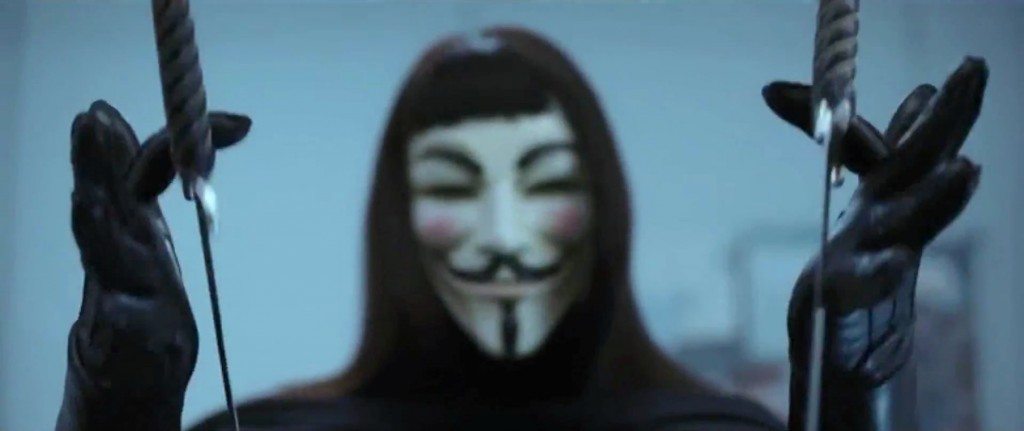
You must be logged in to post a comment.